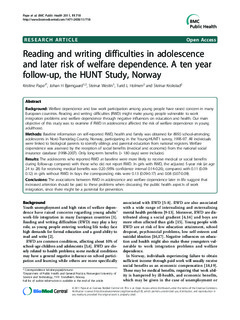Reading and writing difficulties in adolescence and later risk of welfare dependence. A ten year follow-up, the HUNT Study, Norway
Journal article, Peer reviewed
Permanent lenke
http://hdl.handle.net/11250/1215902Utgivelsesdato
2011Metadata
Vis full innførselSamlinger
Sammendrag
Background: Welfare dependence and low work participation among young people have raised concern in many
European countries. Reading and writing difficulties (RWD) might make young people vulnerable to work
integration problems and welfare dependence through negative influences on education and health. Our main
objective of this study was to examine if RWD in adolescence affected the risk of welfare dependence in young
adulthood.
Methods: Baseline information on self-reported RWD, health and family was obtained for 8950 school-attending
adolescents in Nord-Trøndelag County, Norway, participating in the Young-HUNT1 survey, 1995-97. All individuals
were linked to biological parents to identify siblings and parental education from national registers. Welfare
dependence was assessed by the reception of social benefits (medical and economic) from the national social
insurance database (1998-2007). Only long-term benefits (> 180 days) were included.
Results: The adolescents who reported RWD at baseline were more likely to receive medical or social benefits
during follow-up compared with those who did not report RWD. In girls with RWD, the adjusted 5-year risk (at age
24 to 28) for receiving medical benefits was 0.20 (95% confidence interval 0.14-0.26), compared with 0.11 (0.09-
0.12) in girls without RWD. In boys the corresponding risks were 0.13 (0.09-0.17) and 0.08 (0.07-0.09).
Conclusions: The associations between RWD in adolescence and welfare dependence later in life suggest that
increased attention should be paid to these problems when discussing the public health aspects of work
integration, since there might be a potential for prevention.
